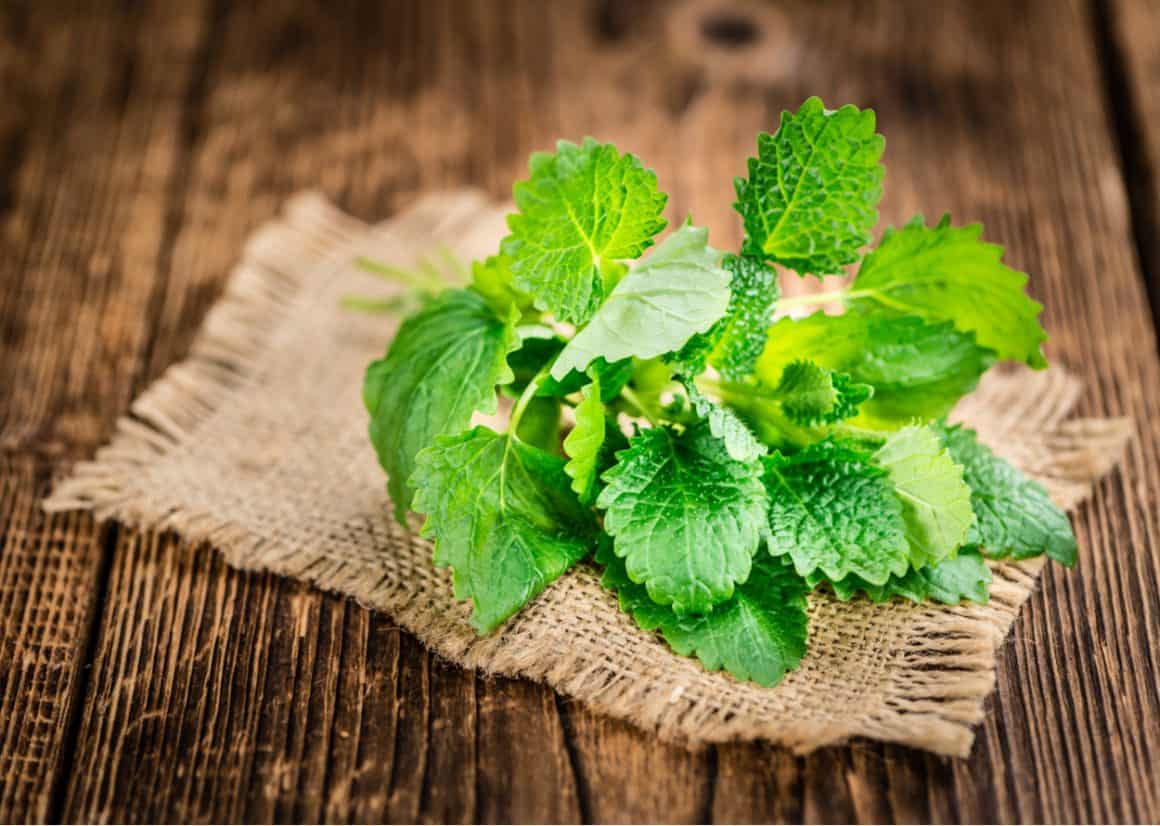Lemon balm, what is it, and does it present any benefits with everyday use? While most of us know the benefits of other popular herbs used in traditional medicine like mint or lavender, we often gloss over lesser-known herbs such as lemon balm.
Lemon balm provides several potential benefits for your health that may surprise you. Before adding the use of lemon balm into your daily routine, it’s important to know the uses, benefits, and side effects of the herb.
What Is Lemon Balm?
Derived from the same family as mint, lemon balm is a lemon-scented herb that was introduced from Europe and has naturalized throughout much of North America.
The leaves of this herb are classified as Melissa officinalis and also go by other common names including balm, balm mint, common balm, and lemon balm. Melissa officinalis has a self-supporting growth form and is apart of the family Lamiaceae.
Lemon Balm Plant
While lemon balm can be bought at popular retailers, you can also plant it yourself. We’ve broken down all that goes into growing this herb at home:
- Watering: For best results, a lemon balm plant must be watered regularly and evenly because it grows best in slightly moist soil.
- Feeding: Lemon balm does not require extra feeding, making it a fairly low maintenance plant to grow.
- Care: In order to practice proper upkeep for the herb, plant it in a bottomless container that keeps the roots in place. Then, be sure to cut plants back by half after flowering to encourage a second crop of leaves and a compact form.
The leaves of this plant are extremely versatile. They can be used to make your own tea, make a lip balm for cold sores, and you can even incorporate them into your cooking.
Lemon Balm Oil
Lemon balm can also be made into a tincture, which is a concentrated herbal extract used for relieving stress, helping digestive complaints, and aiding in sleep.
Lemon balm oil tincture can be made by soaking the leaves from the plant in oil or vinegar. Once this is done, the alcohol or vinegar pulls out the active ingredients in the lemon palm, concentrating them as a liquid.
Lemon Balm Tea
If you’re a tea lover, you’re in luck, because lemon balm leaves can be added to your tea to enhance its flavor and even aid in getting a good night’s sleep.
While you can make your own tea with the leaves, lemon balm tea is also sold in ready-made bags that make it easily accessible.
Benefits
Lemon balm is a versatile herb that can be used for a plethora of treatments. This herb is said to minimize menstrual cramps, reduce nausea, ease headache pain, and reduce anxiety. Some other most common benefits of lemon balm include:
Benefits when taken orally:
- Relieves stress, due to its antioxidant and antimicrobial properties.
- May boost cognitive function
- Helps ease insomnia, when taken in a cup of tea before bed.
Benefits when applied topically:
- Helps with cold sores, lemon balm cream may prolong the intervals between cold sore outbreaks, as well as help heal cold sores when they appear.
- Reduces swelling in skin, due to its antibacterial and anti-inflammatory properties.
- Reduces the occurrence of blackheads, due to its antibacterial qualities.
Side Effects
Though lemon balm is generally believed to be healthy for human consumption, certain side effects can follow. Some potential side effects of lemon balm include:
- Headache
- Painful urination
- Increased body temperature
- Nausea
- Vomiting
- Stomach pain
- Dizziness
- Wheezing
- Skin irritation
- Allergic reaction
While some of these side effects are less common, it’s important to be aware of them in order to know what to look out for when you begin using lemon balm daily.
While these side effects may occur, there are precautions that can be taken to prevent them. To be safe, consume fewer than 2 grams of lemon balm per day.
It’s also important to note that this herb should be used for short-term use. Lemon balm shouldn’t be taken consecutively for longer than four months at a time, so it’s a good idea to take one week off after every three weeks of use.
If you experience any of these side effects, inform your doctor and stop the use of sea moss immediately.
How to Take Lemon Balm
Lemon balm can be taken in a variety of ways, which makes it a very versatile herb for all types of users. Some of these methods in which you can reap the benefits of lemon balm include:
- Mixed in with tea
- Taken as a supplement
- Taken as an extract
- Applied to skin in balms or lotion
- Taken in Flo vitamin gummies
- Used as an essential oil
Dosage
How much lemon balm to take daily? It’s recommended that you take 300 to 600 mg of lemon balm three times per day. You can take a higher dose in acute episodes of anxiety.
Again, it’s important to keep in mind that lemon balm shouldn’t be taken consecutively for longer than four months at a time, so it’s a good idea to take one week off after every three weeks of use.
Final Thoughts
All in all, lemon balm can be a beneficial herb to add to your daily routine. Whether you apply it through your skin, take it as a supplement, or mix into your nightly tea, it’s likely that you’ll find this herb adds some benefit into your daily lifestyle.
Further, when purchasing products that contain lemon balm, look to the packaging labels for more information. You may want to look out for the following:
- What, if any, government labels the package has to determine the level of regulation and testing the product underwent
- Other ingredients in the product that you could be sensitive to
Disclaimers: This article does not constitute professional medical advice, nor can it replace the advice of a licensed professional.








